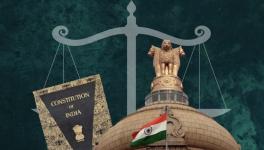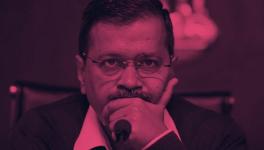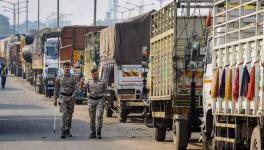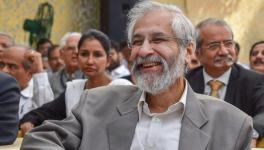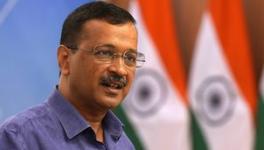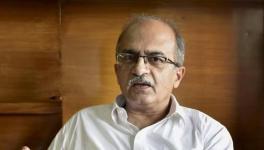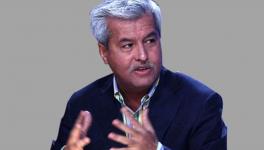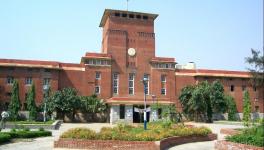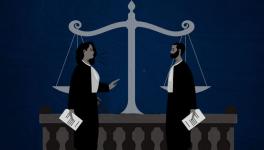SC Bar Association Tries to Undermine Law by Stealth
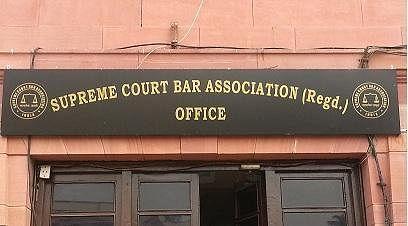
Image Courtesy: Bar & Bench
Groups within the Supreme Court Bar Association (SCBA) headed into a showdown over Thursday and Friday that was triggered by a move that could not only further compromise the independence of the Indian judiciary, but also undermine the professionalism and independence of the Bar itself.
On Thursday, 7 May, the SCBA secretary, one Ashok Arora, announced an “emergent general meeting”, to be held, by his lights, on 11 May, to discuss senior advocate Dushyant Dave’s removal as president and member of the association. The very next day, Arora himself was suspended from the association by its Executive Committee.
The not-so-immediate provocation was a resolution passed by the association on 25 February criticising a speech made by a sitting Supreme Court judge, Justice Arun Mishra, showering encomia on Prime Minister Narendra Modi.
Since the events concerned date back to almost 11 weeks, some recapitulation would help. On 22 February, while delivering the vote of thanks at a global jurists’ conference, Mishra had praised Modi, saying, “India is a responsible and most friendly member of the international community under the stewardship of internationally acclaimed visionary Prime Minister Shri Narendra Modi. We thank the versatile genius who thinks globally and acts locally, Shri Narendra Modi…”
These highly-improper comments provoked a barrage of criticism, including that voiced in a resolution of the SCBA. It said, “The SCBA believes that any such statement reflects poorly on the independence of the judiciary and so calls upon the Honourable Judges not to make any statements in future nor show any proximity or closeness to the Executive, including Higher Functionaries.”
The resolution, which was not unanimous, also said, “Such proximity and familiarity may impact judicial decision-making process and give rise to justifiable doubts in the minds of the litigants about the outcome of case[s].”
The chairperson of the Bar Association of India (BAI), senior advocate Manan Kumar Mishra, later said that he had been present at the event but “did not find anything wrong in Mr Mishra’s speech’. The BAI, however, echoed the SCBA’s viewpoint in a statement that said it was the “foundational obligation [of judges] to maintain a discreet and dignified distance from the Executive branch of the government”. And further, “Such an act serves to dilute the perception of impartiality and independence and diminishes the confidence of general public as judges of Supreme Court are expected to decide cases against the executive branch while upholding constitutional principles and the Rule of Law as paramount.”
Mishra did not offer a public clarification. But the case made out by the two advocates’ associations cannot be gainsaid. Mishra was, clearly, in breach of propriety, if not protocol. At a time when in the public perception the credibility of the judiciary is in tatters, including that of the top court, this kind of an obsequious statement about the head of the executive does not help boost confidence. Even at the best of times, such public statements by public servants, in general, and judges, in particular, are unpardonable.
The entire issue needs to be seen through the prism of the relentless onslaught waged by a progressively authoritarian state—substitute fascist or police, according to choice—that is using the excuse of the pandemic to further concentrate powers, as is happening in many other countries, and is making governance processes increasingly opaque and, beyond scrutiny and critical interrogation.
The Central Election Commission, the office of the Comptroller and Auditor General, that of the Central Vigilance Commission, not to mention the federal arms of law-enforcement such as the Central Bureau of Investigation, the Enforcement Directorate and the income-tax department, have all been to varying degrees suborned by the Bharatiya Janata Party (BJP) government helmed by Modi and Union Home Minister Amit Shah.
In these circumstances, the citizenry, three-fourth of the adult members of which did not vote for this regime, look to the judiciary, especially the Supreme Court, for the defence of life, liberty and fundamental and constitutional rights. Most unfortunately, in the past few years, neither has the judiciary, in its entirety, nor the Supreme Court, in its particularity, stepped up to the plate, with very honourable exceptions.
The question of immediate relevance is why the secretary of the SCBA has chosen this point of time, 11 weeks after the events played themselves out, to instigate action on the matter. Clearly, the motive is to smuggle in support for the establishment under cover of a crisis by attacking the integrity of yet another public institution, which ought to be completely independent of the regime.
It is a relief to note that the president of the SCBA intends to fight craven apologists. Dave has said he will defeat the move, calling it “illegal and improper” and the handiwork of “a motivated individual” with a “personal agenda”. It is not for us to speculate about personal agendas, but the political motive and the likely outcome of such a move is clear. The political motive is to help the state further consolidate power by weakening the independence of the judiciary and the community of independent lawyers and hinder their combined defence of fundamental rights and civil liberties of citizens, especially dissenters, and those belonging to minority and marginalised communities.
The expected outcome is possibly the further destabilisation of checks, balances and scrutiny of an overweening regime. Dave has been a fierce critic of the current regime and has argued in several sensitive cases, including the Ayodhya dispute, muzzling of journalists in Kashmir and the booking of BJP leaders for incitement during the toxic Delhi election campaign earlier this year.
The issue is not one primarily about individuals. It is about democracy and the rule of law in this country, which however flawed, must be defended.
The author is a freelance journalist and researcher. The views are personal.
Get the latest reports & analysis with people's perspective on Protests, movements & deep analytical videos, discussions of the current affairs in your Telegram app. Subscribe to NewsClick's Telegram channel & get Real-Time updates on stories, as they get published on our website.









